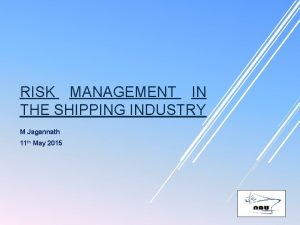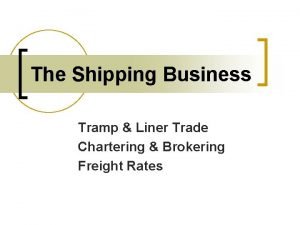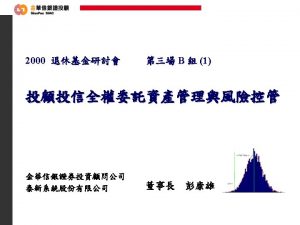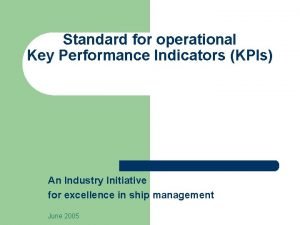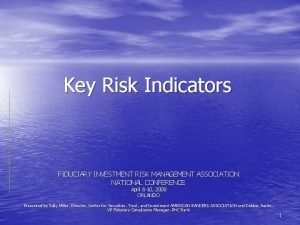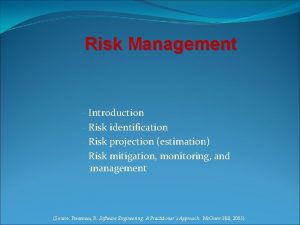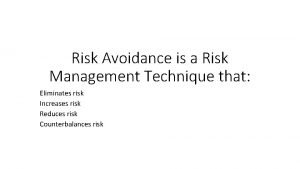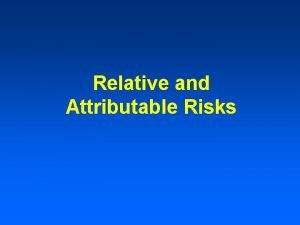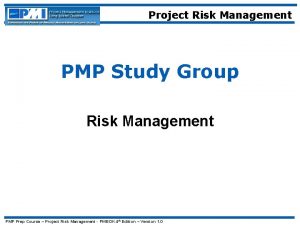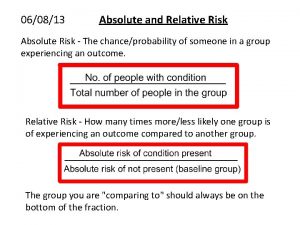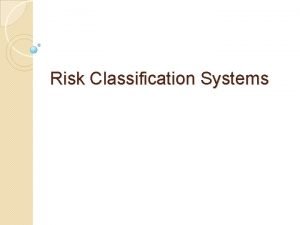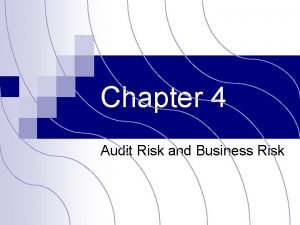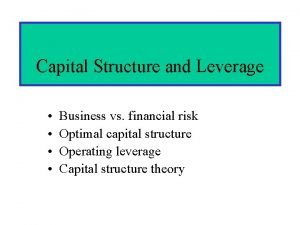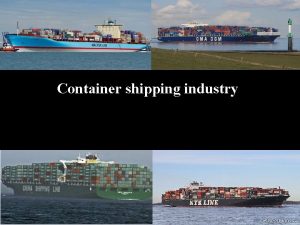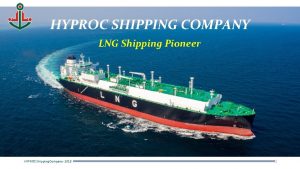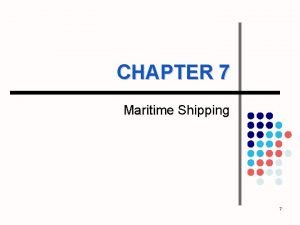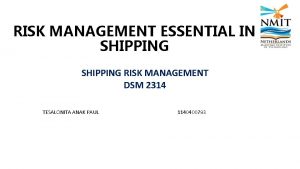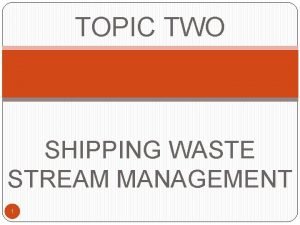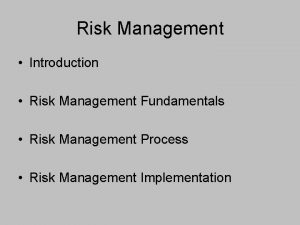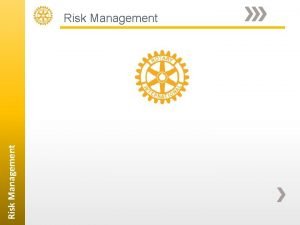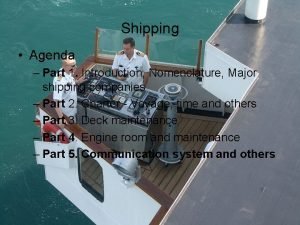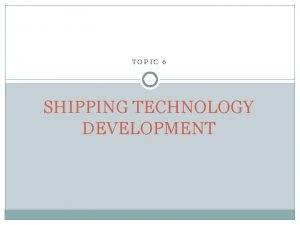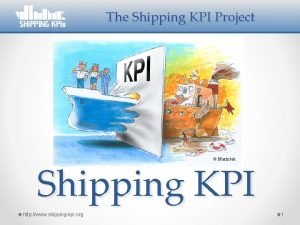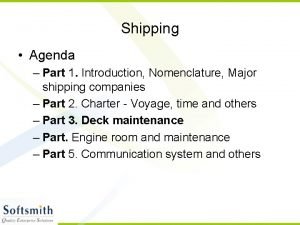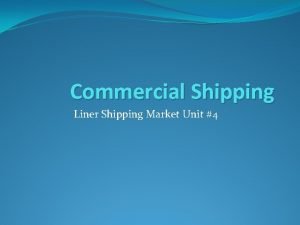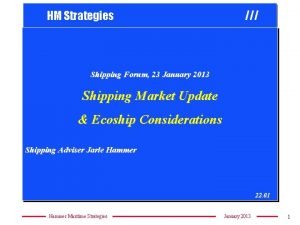RISK MANAGEMENT IN THE SHIPPING INDUSTRY M Jagannath





















- Slides: 21

RISK MANAGEMENT IN THE SHIPPING INDUSTRY M Jagannath 11 th May 2015

Presentation given for general informational purposes only. Information must not be used without proper advice from professionally qualified personnel! DISCLAIMER

Definition: Identification, Analysis & Economic control of those risks which can threaten the assets or earning capacity of an enterprise 3 Steps Identify Analyze Economic Control (nb there are some risks which cannot be physically controlled but economic control is possible) RISK MANAGEMENT

Economic Control q Reduction v Before the loss – proper SOP’s, trade in areas with less risks, etc v After the loss – i. e. measures to mitigate the loss, use of sprinklers q Retention v Attritional losses q Transfer v Contractual Transfer including Insurance RISK MANAGEMENT

Two Types Reactive Proactive Assessment Independent Total Impact RISK MANAGEMENT

Industry has become vast and includes q Ship Owners q Operators / Charterers q Contractual Carriers / Consolidators q Forwarders q Intermediaries (Brokers, Agents, etc) q Service Providers (Surveyors, Consultants, Bunker Suppliers, etc) q Ports & Terminals q Cargo interests ( we are not focusing on this) SHIPPING INDUSTRY

Counterparty : An opposite party in a contract Fundamental in the risk management process KYC If something goes wrong, would one party be left handling the can/problem? q Charterparty risks during low freight market periods q Is insurer properly secured to respond to big claims? q Jurisdictional issues q Central to managing risks but often ignored or inadequately considered COUNTERPARTY RISKS

Some one who owns a vessel Shipping Company – asset play generally long term view – Banks / Financial Institutions – ROI – commoditization - may have inadequate knowledge of the industry Issues q Does the Owner know the counterparty / charterer q Is the charterer good for the money during bad times q Is the BB charterer properly insured for H&M & P&I SHIPOWNER

Voyage Time Charterer – involvement limited Charterer - commercially operates the vessels Bareboat Charter – other extreme – seen as the Owner under law In-house One chartering / part of group activities off chartering Proper risk management process? Risk Transfer – are they properly Insured – Liability Insurance to cover their role? CHARTERERS

Contractual Carriers / NVOCC’s – may have to deal with the loss in the first instance and then recover from overlying carrier Overlying carrier issues Customer issues Caught in between…. Insurance q Liability q Equipment CONTRACTUAL CARRIERS CONSOLIDATOR'S /

Agents in which case, exposure limited Contractual carriers – their role is of a NVOCC – same risks Carriers may contractually incorporate clauses so that FF liable for q Unpaid q Other Freight, detention, demurrage (SLA STC) costs / liabilities arising (undeclared cargo, etc) FF can pursue their customer provided q They q In are good for the money jurisdictions where pursuit is possible Insurance q Liability q FD&D FREIGHT FORWARDERS

Traditionally no liability as role restricted to agency Errors & Omissions may result in exposure to Principals and Third Parties Jurisdictional challenges q Some jurisdictions provide for Ship agents to be jointly and severally liable under local law or port statute (statutory liabilities). q Exposure includes cargo claims, payment of freight tax, customs duty and penalties, removal of wrecks, abandoned cargo, containers, etc. , dock damage, immigration fines and repatriation costs, and oil pollution, principal's commercial debts, such as port and harbour dues, pilotage, bunkers/stores and repairs. Insurance – PI Cover SHIP AGENTS

Technical Manager – duties include taking appropriate risk management processes and purchasing insurance, etc Crew Manager – may be recognized as the employer of crew under domestic law! Jurisdictional Background issues as mentioned for Ship Agents of Owners and Insurance – joint cover under Owners policies and a separate cover under a PI Policy SHIP MANAGER

Imposition of Waiver provisions by Vessel Owners – are they valid (UCTA 1977) Reports for clients use or third parties? Contractual provision for claims - exclusion & limitation of liability Insurance – PI Policy SERVICE PROVIDERS SURVEYORS -

Contractual terms including exclusions & limitations of liability Definition of role and scope of engagement Insurance – PI Cover SERVICE PROVIDERS CONSULTANTS -

Bunker Quality and Quantity (Cappuccino effect) Claims procedure Counterparty risks Owner/Charterer Insurance – i. e. - PI BUNKER BROKERS Supplier and

Various types of Ports & Terminals q Landlord q Tool – PA owns the land Port – PA owns the land equipment q Service – PA is involved in the operation of the port Exposure of Ports & Terminals would depend on q Location – physical risks q Personnel – whether they are properly trained q Jurisdictional challenges for recovery q Counterparty Risks Insurance : Ports & Terminal Cover PORTS & TERMINALS

Risk Transfer mechanism Burn costs – better to retain as the premium would generally include this component i. e. deductible to consider these attritional claims Insurance covers fortuity i. e. a chance occurrence Does not cover certainty i. e. something which is bound to happen INSURANCE

Marine Insurance – Technical Insurance q have Brokers specialized knowledge q Access to overseas markets q Bargaining power with Insurers q Able to assist their clients to navigate the risks q May provide additional services q Generally regulated INSURANCE

Counterparty Depends risks – fortuity or certainty? on the cover and the peril Counterparty risk is more of a financial risk and better to deal with at the outset May result in potential loss of business but WILL reduce exposure to claims Understanding counterparty will not only reduce costs but allow opportunities to focus on core business INSURANCE

Know the specific risks associated with the biz Retain risks which can be dealt with Transfer risks which are difficult to predict / difficult to absorb Know your counterparty so as to avoid SUPRISES CONCLUSION
 Risk management in shipping industry
Risk management in shipping industry Tramp trade software
Tramp trade software Market risk assessment
Market risk assessment Key performance indicators for shipping industry
Key performance indicators for shipping industry Risk management case study oil and gas industry
Risk management case study oil and gas industry Enterprise risk management pharmaceutical industry
Enterprise risk management pharmaceutical industry Key risk indicators financial risk management
Key risk indicators financial risk management Risk map risk management
Risk map risk management What is risk projection in software engineering
What is risk projection in software engineering Risk mitigation avoidance
Risk mitigation avoidance Absolute risk vs relative risk
Absolute risk vs relative risk Residual risk and secondary risk pmp
Residual risk and secondary risk pmp Inherent risks examples
Inherent risks examples Absolute risk vs relative risk
Absolute risk vs relative risk Activity sheet 2: to risk or not to risk?
Activity sheet 2: to risk or not to risk? Medium-term risk examples
Medium-term risk examples Risk financing transfer dan risk retention
Risk financing transfer dan risk retention The biggest risk is not taking any risk
The biggest risk is not taking any risk Business risk audit
Business risk audit Business risk vs financial risk capital structure
Business risk vs financial risk capital structure Attributable risk formula
Attributable risk formula Parirt
Parirt
